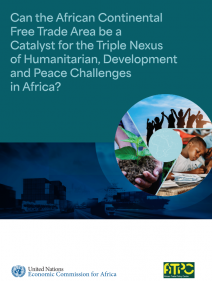Share this:
Release Date:
21 January, 2025
Worldwide, especially in Africa, crises are worsening, leading to more violent conflicts, humanitarian hardships, political instability, and damage to social and economic structures. Conflict, political violence, climate change, and food insecurity are forcing more people to flee their homes than ever before. In 2023, the International Committee of the Red Cross identified eight of the worst humanitarian crises in fragile African nations that struggle to respond effectively.
Today's crises are becoming longer-lasting and more complicated, and current methods to address them are largely ineffective. There is a growing need for multisectoral approaches that meet immediate needs while working towards lasting peace. This report looks at how the African Continental Free Trade Area (AfCFTA) can help with the “Triple Nexus”the Humanitarian, Development, and Peace (HDP) Nexus by promoting trade and economic integration for sustainable development.
In 2016, former UN Secretary-General Ban Ki-Moon called for a “new way of working,” and in 2017, Antonio Guterres introduced the Triple Nexus to address the impacts of conflict and environmental issues. The idea behind better coordination among different sectors is not new, as efforts began in the 1990s to link humanitarian aid and long-term development. However, the Triple Nexus adds the peace element, emphasizing that peace and sustainable development are interconnected.
Implementation of the Triple Nexus is still in its early stages, and more learning and guidance are needed for practical application in various countries. There are few examples of the Triple Nexus in action, and a lack of understanding of how different stakeholder groups work within it is evident. Additionally, many agencies are hesitant to change their approaches, which could slow down collaboration.
Trade can help prevent conflict and stabilize post-conflict areas if properly managed. However, exploitative trade relationships can lead to more conflict. The report explores how the AfCFTA can act as a catalyst for the Triple Nexus, with its aims to boost economic growth and sustainable development. It suggests trade-related measures to enhance productivity, diversify markets, develop skills, and improve infrastructure, ultimately aiming for job creation, poverty reduction, and the achievement of Sustainable Development Goals.

